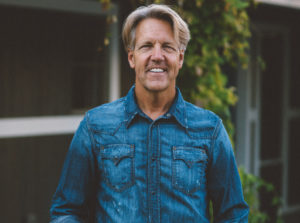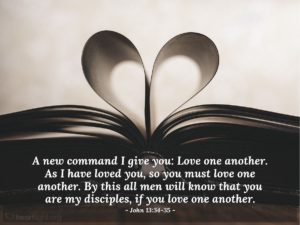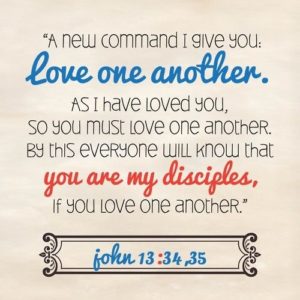
ALBUQUERQUE, NEW MEXICO (ANS)—As Christians, we have the opportunity to show love to those who need the expression of love the most: those who have been hurt by the hatred of others. In countries scarred by past and recent terrorism. In this article, Pastor Skip Heitzig of Calvary Church examines one of the most famous sayings Jesus ever spoke and explored three components of real love—what we should do, and then how and why we should do it.
To get the most from the article, read John 13: 34-35 and answer the questions at the bottom of the article.

What We Should Do: “Love one another”
The world needs love, but it needs a particular kind of love: God’s love. Only His love can transform lives. In this passage of John, the cross was fast approaching, so Jesus left His disciples with a commandment: “Love one another.”
Since when did love need to be a commandment? Love does not spontaneously rise out of human emotion, because the fall made humankind self-oriented, self-centered, and self-focused; it’s our default mode.
This command to love sums up and encapsulates all the other commandments (see Matthew 22:34-40). Is this command to love really new? It shows up in the Old Testament (see Leviticus 19:18). But the word Jesus used for new is kainos, meaning fresh or renewed.
Jesus told His disciples (minus Judas), “Love one another“—in other words, “Let’s tighten the circle and first and foremost love those who follow Christ.” That doesn’t mean we examine every part of a believer’s doctrine before we show love to them; we love them simply because they belong to Christ (see Galatians 6:10).
How We Should Do It: “As I have loved you”
This time of year, love is measured by candy grams, dinners, and gifts. But the love Jesus conveys is a new standard of love, a new comparative benchmark by which we are to love. It raises the bar.
What does this phrase mean exactly? John 15:12-13 tells us: “This is My commandment, that you love one another as I have loved you. Greater love has no one than this, than to lay down one’s life for his friends.” The supreme expression of God’s love was Jesus’ death on the cross:
- It is sacrificial love.
- It is unconditional love (see Luke 23:33-34).
- It is never-ending love.
- It is nonreciprocal love (see Romans 5:8).
- It’s the kind of love we should have for one another.
It’s impossible for you to love like this on your own. But if you’re in Christ, you have a reservoir of love that never runs out (see Romans 5:5). If God’s love can flow into our lives, then it can flow out of our lives.
We have a great capacity to love, which means no one in our lives should ever be starved for love. As Malcolm Muggeridge said, “The greatest evil is the lack of love.”
Why We Should Do It: “All will know you are My disciples”
 By demonstrating self-sacrificing love to our brothers and sisters in Christ, the world will sit up and take notice. Love becomes the billboard that gets passerby’s attention and draws them to follow the Savior we say we believe in. Authentic love that cares deeply for the needs of others validates our profession of faith (see John 17:20-23).
By demonstrating self-sacrificing love to our brothers and sisters in Christ, the world will sit up and take notice. Love becomes the billboard that gets passerby’s attention and draws them to follow the Savior we say we believe in. Authentic love that cares deeply for the needs of others validates our profession of faith (see John 17:20-23).
In Jesus saying this, He was giving the world permission to judge us. By loving one another, we make the invisible God visible (see 1 John 4:12). Jesus physically left the earth, but we are His body, His expression in the world. The telltale sign that we are related to Him is when we demonstrate self-sacrificing, others-oriented love.
As John Stott said, “We cannot proclaim the gospel of God’s love with any degree of integrity if we do not exhibit it in our love for others.” Love supercharges our evangelism. How else are people going to know that you belong to Jesus—by your bumper sticker or your intellect? People don’t care how much you know until they know how much you care.
Let’s learn to evaluate our lives by love—not by how many people love you, but by how many people you love.
Tradition says that in the last days of the apostle John’s life, his disciples carried him to Christian meetings, where he would simply say, “Little children, love one another!” One of his disciples asked him, “Why say just that sentence?” and he answered, “Because it is the Lord’s command, and if this alone be done, it is enough.”
Lip service without life service is empty religion—but lip service accompanied by life service is true devotion, and the world will sit up and take notice.
Connect Up 
What does it tell you about the heart of God that Jesus emblematically demonstrated love by washing the feet of Judas, the man He knew would betray Him? (See John 13:2-5; see also Ezekiel 18:23; Romans 2:4; 2 Peter 3:9.)
Connect In
What does loving other believers self-sacrificially and authentically look like in a practical sense? What are some ways you have either shown or been shown this kind of love by fellow Christians? Did it change the way you viewed the church? If so, how?
Connect Out
 Share any stories you might have about non-believers taking notice of the love Christians have for one another. How can you use a real-life example of Christians loving Christians—for instance, the Love Bomb ministry of Reload Love—to begin a conversation with a non-believer about God’s great love for them?
Share any stories you might have about non-believers taking notice of the love Christians have for one another. How can you use a real-life example of Christians loving Christians—for instance, the Love Bomb ministry of Reload Love—to begin a conversation with a non-believer about God’s great love for them?
This article was compiled and drafted by Lorin Bentley.







